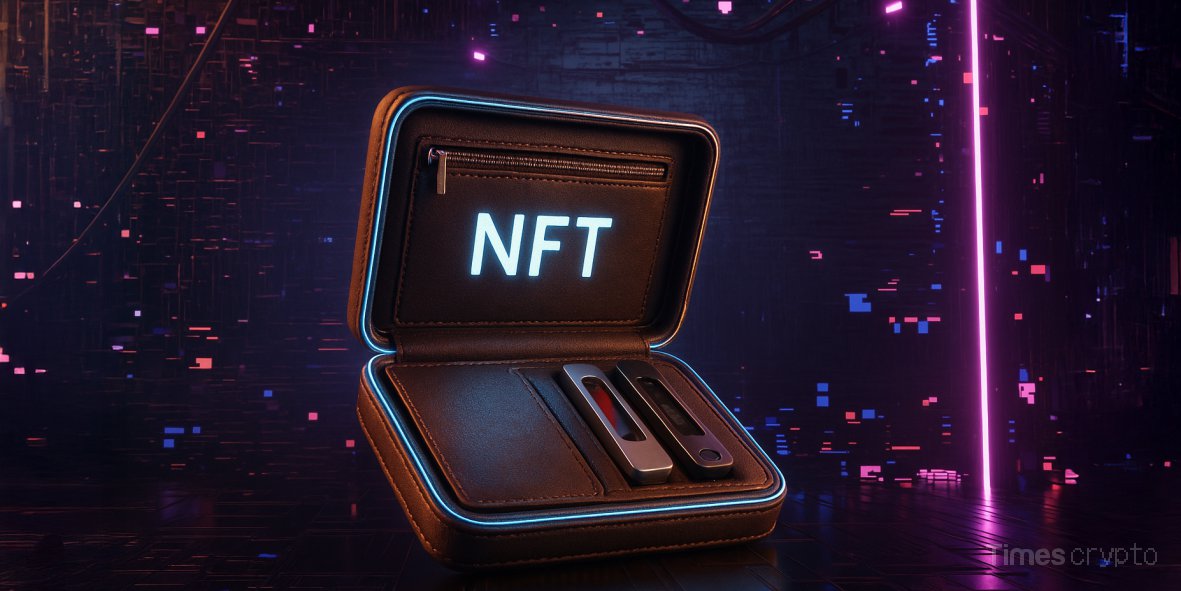Key Takeaways
- NFT wallets are essential for securely managing and storing unique digital assets. They enable safe transactions and long-term protection of valuable NFTs.
- Security plays a crucial role in NFT success, especially with high-value collections. Choosing the right wallet can mean the difference between protecting your investment and suffering major losses.
- Hardware wallets offer the highest level of protection by keeping assets offline and away from online threats. Solutions like Ledger Flex and Cypherock X1 are ideal for serious investors seeking maximum security.
- Using multiple wallets allows investors to balance security with trading convenience. A smart strategy combines hardware wallets for storage with software wallets for quick and flexible transactions.
- The best wallet choice depends on the portfolio size, risk tolerance, and blockchain activity. Premium wallets suit large holdings, while software options may be better for frequent traders and smaller investments.
NFT Wallets Secure Valuable Digital Assets
When 12-year-old Benyamin Ahmed sold his Weird Whales Non-Fungible Tokens (NFTs) collection for over $255,000 in a single day, he demonstrated how digital assets can transform creative passion into life-changing wealth. Ahmed sold 3,350 pixelated whales at 0.025 ETH per unit in less than a day, turning $300 into approximately $255,000, based on August 2021 values.
Indeed, NFTs are making the headlines for all the right reasons. They are unique digital assets, including JPEGs and video clips, that are represented by code recorded on a blockchain. Each NFT can be bought and sold, just like physical assets.
Ahmed’s remarkable success story reflects the transformative power of NFTs and also their wallets. The security features of their wallets are a key reason why NFTs are so popular. Their wallets have evolved from simple storage tools into sophisticated digital vaults that protect and facilitate million-dollar transactions. These wallets are specialized digital storage solutions designed to hold these tokens and interact with blockchain networks. Unlike traditional cryptocurrency wallets that primarily store fungible tokens like Bitcoin or Ethereum, NFT wallets store unique digital assets, like one-of-a-kind art or collectibles, that have special details and history. Because of this, NFT wallets need to support different kinds of digital assets and marketplaces.
These specialized storage solutions now serve as the foundation of a thriving digital economy, where the right wallet choice can mean the difference between securing generational wealth and losing everything to cyber threats.
When your digital collection is worth six figures, security is everything. Software wallets are convenient but vulnerable; hardware wallets are secure but slow. NFT wallets strike the right balance—offering strong protection, easy trading, and marketplace integration. Here’s a quick look at the top NFT wallets to help investors choose the best fit for their needs.
Hardware Wallets: Digital Asset Fortresses You Can Trust
Ledger Flex stands as the undisputed champion for serious NFT collectors. This premium device combines CC EAL5+ certified secure chips with Bluetooth connectivity, allowing investors to showcase their prized collectibles while maintaining offline security. The wallet’s complete isolation from internet connectivity eliminates attack vectors that regularly compromise software alternatives.
Cypherock X1 is another wallet that is a must to consider. It revolutionizes wallet security through its innovative seedless design. The system splits private keys across five components using Shamir Secret Sharing technology, requiring only the hardware vault plus one card for transactions. This architecture eliminates single points of failure while supporting over 9,000 digital assets.
The wallet’s built-in inheritance feature solves a critical problem plaguing digital asset holders: estate planning. High-net-worth collectors can now designate recovery methods without exposing sensitive seed phrases to family members or legal representatives.
Cross-Chain Expertise: Exploring Beyond Ethereum’s Limits
Smart investors recognize that NFT value increasingly spans multiple blockchain networks. While Ethereum maintains dominance, Solana, Polygon, and emerging networks capture growing market share, demanding wallets that support cross-chain operations.
Phantom Wallet dominates Solana NFT trading with its native blockchain support and specialized features. The “Instant Sell” functionality monitors buy offers across marketplaces, enabling rapid liquidity access during market volatility. With over 32 million downloads, Phantom demonstrates proven scalability for high-volume trading scenarios.
Zengo addresses multi-chain requirements through comprehensive network support while eliminating seed phrase vulnerabilities. The multi-party computation security model distributes risk across encrypted shares, reducing human error in key management protocols.
Premium Security: Worth Every Penny
For portfolios exceeding six figures, premium security subscriptions justify their costs through enhanced protection features. Zengo Pro’s $129.99 annual subscription provides multi-factor authentication, web3 firewall protection, and private transaction modes that become essential when managing institutional-scale NFT allocations.
Ellipal Titan 2.0 maintains complete air-gap security through QR code transactions, featuring a tamper-resistant design with self-destruct mechanisms that wipe keys upon physical breach detection. This military-grade approach suits collectors with maximum security requirements.
Balancing Security and Convenience
D’Cent Wallet combines hardware security with mobile convenience through biometric authorization. The built-in fingerprint sensor provides quick access while maintaining private key isolation, reducing operational friction without compromising security protocols.
The wallet’s multi-chain support extends across Ethereum, Polygon, Binance Smart Chain, and Klaytn networks. Integrated swap functions and staking tools generate additional yield from NFT portfolio management activities.
The Winning Formula Is The Strategic Wallet Selection
Software wallets like Exodus provide feature-rich, user-friendly environments at no cost but typically offer less security than hardware wallets. Its NFT Gallery interface makes managing your digital collectibles easy and supports over 50 blockchain networks. Plus, integration with Trezor hardware wallets gives users a secure upgrade path as their portfolios grow.
MetaMask remains the gold standard for Ethereum-based NFTs despite limited non-EVM support. Its open-source architecture enables custom functionality through Snaps, creating competitive advantages for sophisticated users who demand flexibility.
Successful NFT investors employ multi-wallet strategies combining hardware security for cold storage with software wallets for active trading. This approach balances security with operational efficiency while maintaining portfolio diversification across multiple blockchain networks.
Hardware wallets justify their cost for holdings exceeding $10,000, while software solutions suit smaller allocations and frequent trading strategies. The optimal configuration depends on individual risk tolerance and investment scale, but the principle remains constant: security infrastructure determines long-term success.
As NFTs mature toward institutional adoption and mainstream acceptance, investors who prioritize wallet security position themselves advantageously in an increasingly sophisticated digital economy.
Read More: What are NFTs? The Rise of Digital Collectibles and Their Role in Web3



